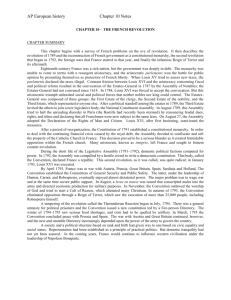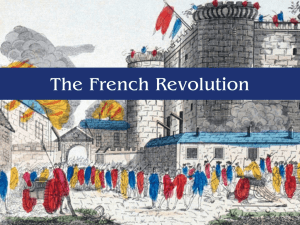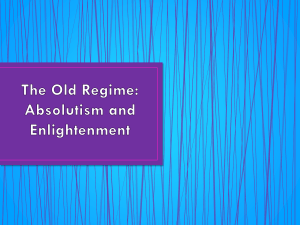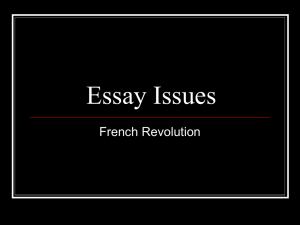Comparison of the English Revolution and French Revolution
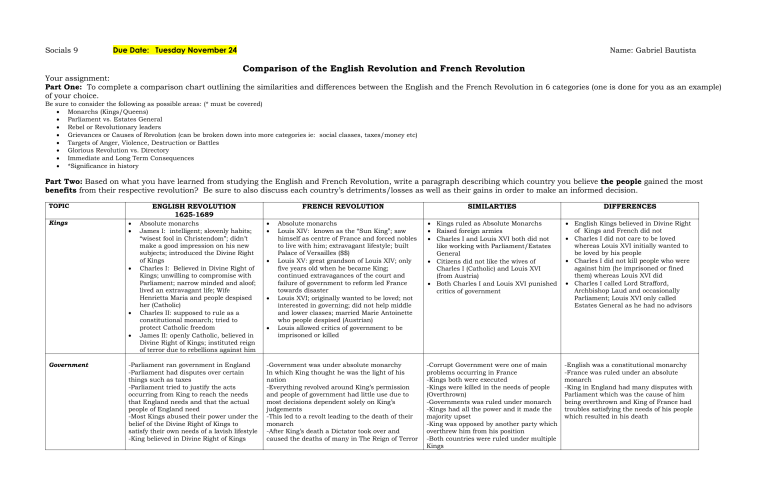
Socials 9 Due Date: Tuesday November 24
Comparison of the English Revolution and French Revolution
Name: Gabriel Bautista
Your assignment:
Part One: To complete a comparison chart outlining the similarities and differences between the English and the French Revolution in 6 categories (one is done for you as an example) of your choice.
Be sure to consider the following as possible areas: (* must be covered)
Monarchs (Kings/Queens)
Parliament vs. Estates General
Rebel or Revolutionary leaders
Grievances or Causes of Revolution (can be broken down into more categories ie: social classes, taxes/money etc)
Targets of Anger, Violence, Destruction or Battles
Glorious Revolution vs. Directory
*Significance in history
Immediate and Long Term Consequences
Part Two: Based on what you have learned from studying the English and French Revolution, write a paragraph describing which country you believe the people gained the most
benefits from their respective revolution? Be sure to also discuss each country’s detriments/losses as well as their gains in order to make an informed decision.
TOPIC
FRENCH REVOLUTION SIMILARTIES DIFFERENCES
Kings
Government
ENGLISH REVOLUTION
1625-1689
Absolute monarchs
James I: intelligent; slovenly habits;
“wisest fool in Christendom”; didn’t make a good impression on his new subjects; introduced the Divine Right of Kings
Charles I: Believed in Divine Right of
Kings; unwilling to compromise with
Parliament; narrow minded and aloof; lived an extravagant life; Wife
Henrietta Maria and people despised her (Catholic)
Charles II: supposed to rule as a constitutional monarch; tried to protect Catholic freedom
James II: openly Catholic, believed in
Divine Right of Kings; instituted reign of terror due to rebellions against him
-Parliament ran government in England
-Parliament had disputes over certain things such as taxes
-Parliament tried to justify the acts occurring from King to reach the needs that England needs and that the actual people of England need
-Most Kings abused their power under the belief of the Divine Right of Kings to satisfy their own needs of a lavish lifestyle
-King believed in Divine Right of Kings
Absolute monarchs
Louis XIV: known as the “Sun King”; saw himself as centre of France and forced nobles to live with him; extravagant lifestyle; built
Palace of Versailles ($$)
Louis XV: great grandson of Louis XIV; only five years old when he became King; continued extravagances of the court and failure of government to reform led France towards disaster
Louis XVI; originally wanted to be loved; not interested in governing; did not help middle and lower classes; married Marie Antoinette who people despised (Austrian)
Louis allowed critics of government to be imprisoned or killed
-Government was under absolute monarchy
In which King thought he was the light of his nation
-Everything revolved around King’s permission and people of government had little use due to most decisions dependent solely on King’s judgements
-This led to a revolt leading to the death of their monarch
-After King’s death a Dictator took over and caused the deaths of many in The Reign of Terror
Kings ruled as Absolute Monarchs
Raised foreign armies
Charles I and Louis XVI both did not like working with Parliament/Estates
General
Citizens did not like the wives of
Charles I (Catholic) and Louis XVI
(from Austria)
Both Charles I and Louis XVI punished critics of government
-Corrupt Government were one of main problems occurring in France
-Kings both were executed
-Kings were killed in the needs of people
(Overthrown)
-Governments was ruled under monarch
-Kings had all the power and it made the majority upset
-King was opposed by another party which overthrew him from his position
-Both countries were ruled under multiple
Kings
English Kings believed in Divine Right of Kings and French did not
Charles I did not care to be loved whereas Louis XVI initially wanted to be loved by his people
Charles I did not kill people who were against him (he imprisoned or fined them) whereas Louis XVI did
Charles I called Lord Strafford,
Archbishop Laud and occasionally
Parliament; Louis XVI only called
Estates General as he had no advisors
-English was a constitutional monarchy
-France was ruled under an absolute monarch
-King in England had many disputes with
Parliament which was the cause of him being overthrown and King of France had troubles satisfying the needs of his people which resulted in his death
TOPIC
Taxes
Social Classes
Religion
ENGLISH REVOLUTION
1625-1689
FRENCH REVOLUTION SIMILARTIES DIFFERENCES
-Kings taxed people in order for themselves to live their lavish lifestyles
-Taxes become a problem when it came to parliament since whenever the king needed money he'd ask for parliament to raise them but of course parliament declined
-Due to parliament disapproving the request of the king request he became clever and came up with his own illegal taxes to get money (Tunnage, Poundage,
Ship money and more)
-There were different importance of titles in England such as The Monarch, Clergy,
Nobles and Lord’s
-Often there were radicals that were regular people who weren’t in the higher ranking classes (Such as The Clergy) to help fight back against King’s army
-Districts were formed in England which split up the people and enforced people to act according to very strict laws
-Religion played big role to why English
Revolution occurred
-People revolted against Catholicism and people wanted religion to be worshipped the same all around
-France taxed the poor more than what they earned
-Taxes made living incredibly hard causing the poor to eventually fight each other just for food or starve to death
-Taxes were payed off by the poorest estate
-Those who weren't in the third estate had the privilege to pay almost no taxes
-France was going bankrupt so it's taxes made it incredibly hard for the minority classes to pay their dues
-10% of a person’s salary was given to the
Church (Tithes)
-France divided into 3 different estates
-Each estate had different rights and privileges
-Those in 1 st and 2 nd estate didn't have the struggle of the taxes being paid since they didn’t receive as many taxes as 3 rd estate
-Third estate made up almost all of the population in France
-First and 2 nd estate had most power
-Radical members which were majorly part of the poor Third Estate were the ones who helped push
Revolution further
-People were forced on laws to shape how society should look like to their Dictator (Napoleon)
-Enlightenment helped remove the idea of a person being forced to the idea of The Church and tried replace it with a sense of a person’s own beliefs
-Religion didn’t impact the way the people saw their King because of other reasons
-Taxes of both countries made the people upset
-Taxes went towards the needs of the King and not towards the needs of the people
-Taxes were unjust and unnecessary to the extent they were put at (Increasing price of bread, King’s taxes in England)
-Taxes were the first problems each country faced that started the beginning of each revolution
-France suffered great debt due to
American War
-England taxed everyone greatly unlike how in France the poor were targeted to pay heavy taxes
-There typically was The Clergy, Nobles and others and then lastly the poor or just the people of the nation
-In the thought of Social Classes radical groups formed from the poor or ordinary people to help push forward movement of each Revolution
-King was always most important in hierarchy of classes
-Each country were put under strict laws that lowered their Social capabilities to have with one another
-Both countries had The Clergy play a big part of their society at one point
-Some money people paid went towards the Church
-Two different groups fought over mainly religious reasons
-In England there weren’t Three different
Estates or groups people were put in
-France’s Estates caused different people to have more privileges and rights unlike how classes were in England
-Religion caused many disputes and overall people in England in their fury acted on this with
-France’s church wasn’t criticized by other political groups
Significance
In History
-England introduced a constitutional monarchy where King isn’t in power
-It shaped the way government would be held in England because there were many mistakes created when one person ruled and had most of the power
-Robespierre introduced metric system, calendar and more to France
-France introduced branching out the power in government so it isn’t all in one area
-Guillotine was a procedure used as a death sentence and was used in other countries as well
-Both countries went through a phase of being ruled both under an absolute monarch who did everything they pleased and with a dictator who deemed to make things run according to what they seemed right
-Both countries went through their people fighting and revolting for things they wanted to see change and it worked, proving that the people had so much power over their government
-France went through a bloodier and more frightening time in history due to the amount of death that occurred so often
-England’s people feared their King and what he would to the Revolution occurring in England so it caused to the people of
England to go through a Great Fear


